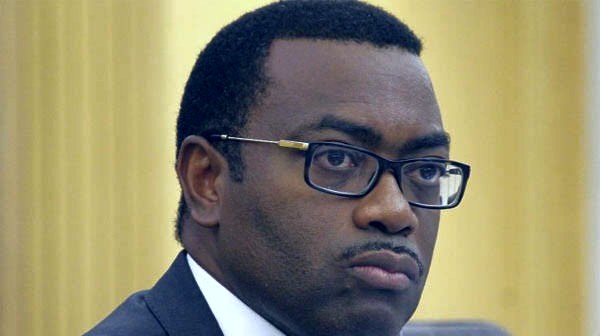By Emeka Alex Duru
The expression by the President, Muhammadu Buhari on the re-election of Dr. Akinwunmi Adesina as President of the African Development Bank (AfDB); “He serves it”, confirms the attribute of hard work and dedication many speak of the former Agriculture Minister. Coming on the heels of a storm that almost marred his election, Adesina’s inauguration on September 1, offers a window for Nigeria reinvent its prime position in African politics and beyond. At a time that the country’s image has been serially battered by untoward activities of some of the citizens in areas of cybercrime and other negative conducts, Adesina’ second term in AfDB, calls for celebration. The President was thus, right in his ululation.
Rocky path to a second term
In 2015 when Adesina was first elected to the office, it was with relative ease. Five years after, his bid for a second term nearly ran into a ditch because of huge obstacles mounted on his way by the United States of America (USA).
An unnamed group had in a 16-point memo, accused Adesina of impropriety and fraud, thereby violating the code of conduct of the institution. Not finding any substance in the allegations, the Bureau of Board of Governors of the Bank had earlier upheld reports of the Ethics Committee of the Bank, headed by Takuji Yano, a Japanese Executive Director, which exonerated Adesina of all the charges.
Regardless, the United States government expressed deep reservations about the integrity of the committee’s process and called for a fresh in-depth investigation of the allegations using an independent investigator.
In a curious twist, the Bureau of Board of Governors bowed to the U.S and authorised an independent review of the ethic committee’s report. The approval by the Bureau of Board of Governors for an independent investigation of the allegations against Adesina, was an issue that caused concern on his re-election.
Many suspected hidden hands of the US in using the review panel to dictate who the next President of the Bank would be. For one, the angle of an external investigator was strange to the workings of the AfDB. It was also seen as a subtle way of manipulating the affairs of the institution by vested interests and by that pushing African Regional Member Countries to the periphery. Akinwunmi however weathered the storm and was exonerated of all the charges by the review panel. That was seen in diplomatic quarters as a moment of victory and an uncommon accomplishment for him and Nigeria.
Reaping from purposeful first term
His trademark prudence was complimented by innovations in repositioning AfDB. The bank under his watch attracted $78.8 billion worth of investments to Africa in two years. Under the High 5s Programme which was launched by the Bank when Adesina was first elected in 2015, the AfDB has positioned itself as a catalyst in the development of the continent. The achievements of the High 5s include providing 18 million people with access to electricity, 141 million people connected to improved agricultural technologies for food security; 15 million people exposed to finances from private investments; 101 million people given access to improved transport from infrastructure; 60 million people provided with water and sanitation facilities. The programme also impacted 335 million people.
Agenda for AfDB
In his second coming, Adesina has pledged to focus on building a stronger institution, strengthening human capacity, enhancing the Bank’s effectiveness as well as maintaining financial sustainability before the end of his second term. Adesina also promises according special attention to regional industrial value chains and the strengthening of financial markets in order to expand intra-regional trade and competitiveness, and boost the Africa Continental Free Trade Area. He also promised to extend the activities of the Bank in the areas of empowering the youth.
At a time of shrinking resources and overwhelming impact of the corona virus (COVID-19) pandemic on major economies of the world, sustaining the giant strides in AfDB and building on them, may be quite tasking for Adeina and his team. But with pragmatic leadership reminiscent of his vision in his first term, he seems poised to excel. Incidentally, he has vowed to roll up his pants for more engagement. Not many would be surprised at his pledge.
The man, the job
For the 60-year old, former Agriculture Minister, excellence, appears his second name. From the University of Ife (now Obafemi Awolowo University), where he earned a Bachelor’s Degree in Agricultural Economics with First Class Honors from in 1981, to Purdue University in Indiana, USA, where he obtained his PhD (Agricultural Economics) in 1988 with the Outstanding PhD Thesis for his research work, Adesina has always made marks in his endeavours. His career profile equally speaks volume in accomplishment. These are the traits he has brought to AfDB with corresponding successes.
AfDB: the mission, the vision
AfDB is a multilateral development finance institution, founded in 1964, originally by 23 African countries as regional development bank. The idea of establishing the Bank came along that of formation of the then Organisation of African Unity (OAU), currently the African Union (AU). While the draft charter of the OAU took effect in 1963, that of the AfDB came on board in 1964. OAU was tailored at achieving continental unity, while the Bank aimed at addressing the development challenges of the emerging states in the continent. The AfDB comprises three entities: The African Development Bank, the African Development Fund and the Nigeria Trust Fund.
Its mission is to fight poverty and improve living conditions on the continent through promoting the investment of public and private capital in projects and programmes that are likely to contribute to the economic and social development of the Region
The inaugural meeting of the Board of Governors was held from November 4 to 7, 1964 in Lagos, while the Headquarters was opened in Abidjan, Cote d’Ivoire in March 1965. The Bank was originally an exclusive African entity till 1982 when it opened its doors to non-Africans. It now has 54 African member nations and 27 non-African member states. Nigeria has the largest shareholding in the Bank, followed by America, Egypt and Japan.











